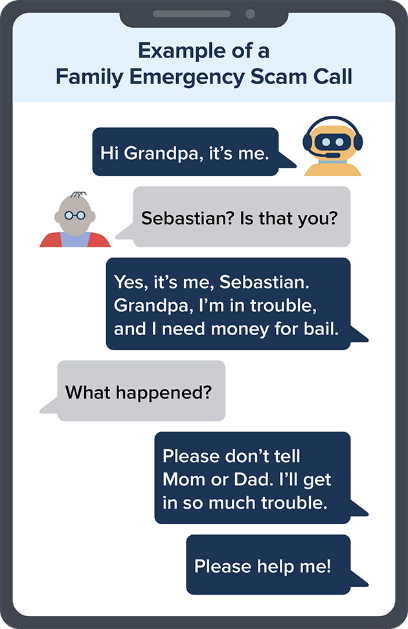In recent years, technology has advanced to the point where machines can replicate human speech with incredible accuracy. This technology is called AI voice cloning, and while it has many practical applications, it has also given rise to a new kind of scam.
AI Voice Scam Calls
AI voice cloning is being used by scammers to impersonate people and deceive victims into giving away money or sensitive information. Using a short video clip of someone’s voice from social media, scammers can easily create a voice clone of that person and then call their family/friends/colleagues and impersonate them.

AI Kidnapping Scam
Scammers have recently used AI voice generator technology to make it appear as if they have kidnapped children and demanded large ransoms from distraught parents.
Earlier this month it was reported that scammers cloned the voice of a 15-year-old girl from Arizona, called up her mom pretending to be her, and threatened to harm her before demanding a $1 million ransom. The girl’s mom was beside herself with worry as she heard her daughter’s voice sobbing and saying she “messed up”. The mother was convinced that her daughter was in danger until she was able to confirm that she was safe and sound on her skiing trip.
The Federal Trade Commission has warned the public about voice cloning scams and urged people to report any incidents to the agency at ReportFraud.ftc.gov.

AI Voice Scam Red Flags
AI voice scams can be highly deceptive, but there are a few things to look out for:
- The use of urgent language and demands for money.
- The caller asks you to send cryptocurrency, buy gift cards, or pay them using some other untraceable method.
- Suspiciously good voice recording quality and/or no discernable background noise.
- Inconsistencies in the story or information provided.
- The kidnapped person not being able to tell you your pre-arranged safe word (if you had previously set one up together).
How to Protect Yourself Against AI Voice Scams
- Be cautious when receiving unexpected phone calls or messages.
- If a call is suspicious, end the call and contact your friend/family member/colleague directly or call someone else who can confirm the situation.
- Be skeptical when asked for money via cryptocurrency, gift cards, etc.
- Don’t overshare on social media because it can enable scammers to add believability to their lies.
- If you suspect that you are being scammed, report it to the FTC immediately.
- Consider downloading Trend Micro Check, which can block unwanted phone calls, annoying spam text messages, and protect you against malicious links in messages on apps such as WhatsApp, Telegram, and Tinder.
If you’ve found this article an interesting and/or helpful read, please SHARE it with friends and family to help keep the online community secure and protected. Also, please consider leaving a comment or LIKE below.
2 Comments
- By Linda Crawford | May 25, 2023
- By Eileen Boudreau | May 25, 2023
